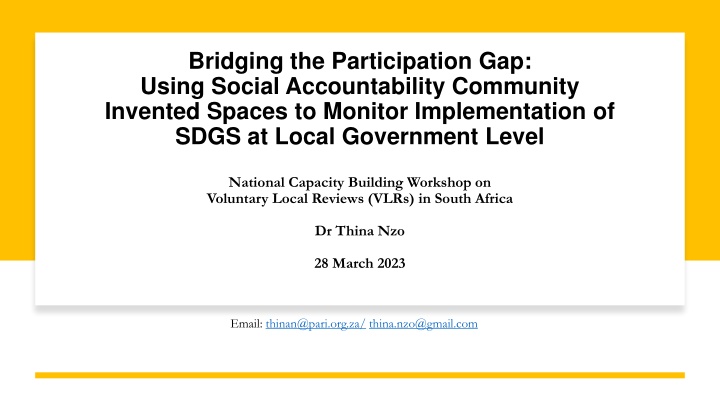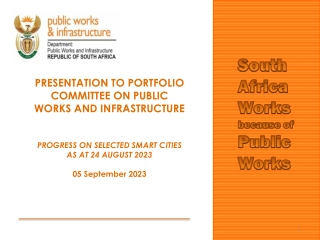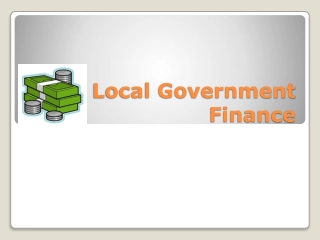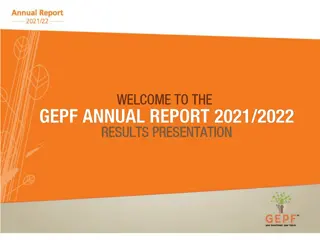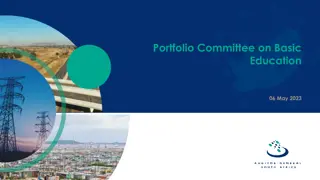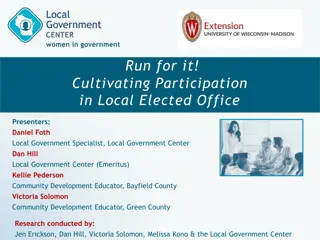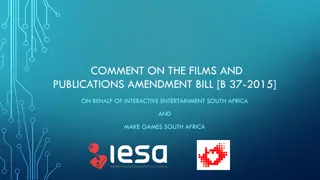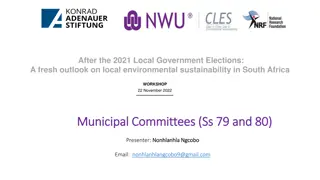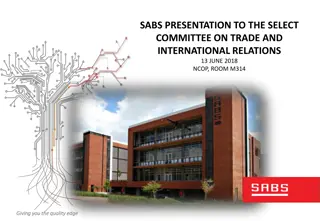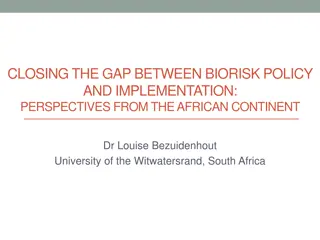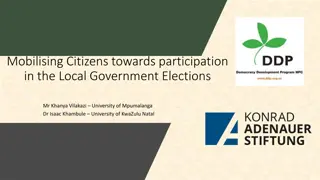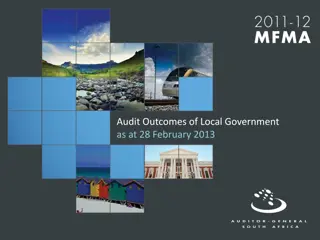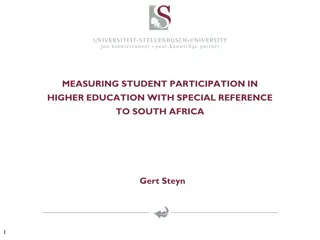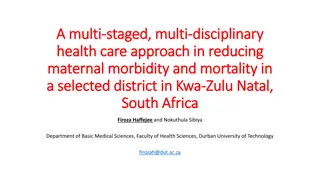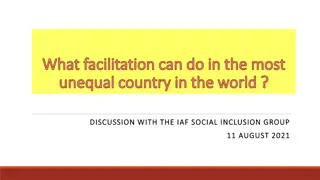Local Government Participation and Social Accountability in South Africa
South Africa's legal framework supports participatory governance at the local government level, emphasizing civil society's role in holding authorities accountable for delivering essential services. The evolution of civil society from anti-apartheid movements to watchdogs of democracy reflects a complex state-society dynamic.
Uploaded on Mar 14, 2025 | 1 Views
Download Presentation

Please find below an Image/Link to download the presentation.
The content on the website is provided AS IS for your information and personal use only. It may not be sold, licensed, or shared on other websites without obtaining consent from the author.If you encounter any issues during the download, it is possible that the publisher has removed the file from their server.
You are allowed to download the files provided on this website for personal or commercial use, subject to the condition that they are used lawfully. All files are the property of their respective owners.
The content on the website is provided AS IS for your information and personal use only. It may not be sold, licensed, or shared on other websites without obtaining consent from the author.
E N D
Presentation Transcript
Bridging the Participation Gap: Using Social Accountability Community Invented Spaces to Monitor Implementation of SDGS at Local Government Level National Capacity Building Workshop on Voluntary Local Reviews (VLRs) in South Africa Dr Thina Nzo 28 March 2023 Email: thinan@pari.org.za/ thina.nzo@gmail.com
Legislated Participatory Governance in South Africa In South Africa, local government participatory processes and structures are important spaces where local civil society and social movements can play a critical role in putting pressure on local government to deliver on their constitutional developmental mandate in delivering basic services such as water, sanitation, electricity, refuse collection, roads, infrastructure, and economic development irrespective of fiscal and administrative capabilities of municipal institutions. These are provided in Chapter 7 of the South African Constitution which outlines the development objectives of local government South Africa has a progressive legislative framework such as the White Paper on Local Government (1998), Local Government Municipal Systems Act 32 of 2000, Local government Municipal Structures Act 117 of 1998 which provides communities and civil society a platform state participatory invited spaces such as ward committees, budgeting and planning process, including performance reviews to foster a coherent relationship between the. White Paper on Local Government (1998; 53) states that the promotion of local democracy should be seen as a central role for any municipal government where the local sphere is an arena for people to participate in decision-making to shape their own living environments, and exercise and extend their democratic (social, economic and political) rights. Instead, we have observed a proliferation of community protests and invented participatory spaces, working parallel to participatory invited space because of dysfunctional ward committee systems.
Sustainable Development Goals are Local State Goals
State-Society Relations Civil society is often seen to be complementing state power (weaker sense) or providing an alternative to it (stronger sense). However, this minimalist view does very little in helping us in disentangling the complex relations between the state and society from below , where the relationship between the state, civil society and communities waxes and wane in the realm of state formation. In South Africa, civil society has gone through a process of evolution from being part of the anti-apartheid movements working against oppressive state power, towards cohesively working with the post-apartheid government during the transitional period in building a democratic state. The consolidation of post-apartheid democratic state institutions also happened parallel with the rise in grand corruption, state capture and institutional practices that sought to undermine South Africa s constitutional democracy and good governance. Once again, civil society had to reposition itself and resume a rigorous oversight role in demanding accountability, transparency and litigating against the executive members of government in defending the country s constitutional democracy. These kinds of shifts in the roles of civil society have allowed us to further interrogate and rethink our assumptions about civil society as non-state actors, operating outside the parameters of the state.
State-Society Relations: What Constitutes the Local State? The Question of State and Non-State Actors? Civil society does not exist in isolation from the state. Civil society s associational life is a function of the state. Its social incoherence, economic decline, involvement in local politics, linkages with political elites and state institutions and contestation over local territorial authority are a mirror image of the state (Fatton 1995). Where state institutions have failed to deliver public goods and services to marginalised communities, communities deal with this not by only embracing formal civil society but by developing strategies which generate community driven alternative socio-economic responses through informal civic social movements and community organising in conjunction to state institutions. This contributes to the constant evolution of civil society within the praxis of the state. Greater political pluralism has enabled us to shift emphasis away from the view that civil society can replace the state because it is insulated from local politics or that it is irrelevant to wider political processes. The mere fact that invented spaces and mass protests have become central in constructing informal structures for grassroots community participation and action concerning poor service delivery and socio- economic deprivation (Miraftab, 2004), this demonstrates how informal civic formation has come to re- shape the rules of socio-economic and political engagement with local government state institutions.
The Relationship between the State, Formal and Informal Civil Society, and Community Relationship between the State, Formal and Informal Civil Society, and Community
Civil Society and Local Government Formal Civil society organisations are generally understood to comprised of visible, legally recognised organisations and institutions who operate at local, provincial, and national level. They have institutional capacity that enables them to actively engagement with the state as national, provincial, and local NGOs, business associations, independent trade unions, and well-resourced and established community organisations. While there is a general understanding of the role and organised civil society, it s also crucial to understand that most civil society organisations operating at local government level, particularly in rural communities are not nearly formal in their formation. In fact, the normative term civil society used as a catch all phrase to describe non-state actors does very little to demonstrate the heterogenous nature of informal and formal organisation of non-state actors. Informal civil society: in response to needs within communities, many small, locally focused informal community- based organisations have proliferated in the midst of state failure, although they are not registered entities (Graham et al, 2008:16). They still fulfil a very important role in socio-political life of local communities. In addition, community members have come together to cooperatives as part of poverty alleviation strategies, landless farmers, informal traders, informal waste pickers, youth and women formations, who are doing work that is aligned with achievement of SDGs. In the early part of the last decade, social movements (informal and loosely structured collectives of community members focusing on a particular issue) have managed catch the attention and support of society as unelected community leaders and activists, despite or perhaps due to their lack of structure and formality (ibid).
Civil Society and Local Government Most of these formal and informal civil society organisations are beginning to do work on social accountability in collaboration with communities at local government level. Formal civil society organisations such The International Budget Partnership (IBP), PLANACT, Afesis-Corplan, Mining Affected Communities United in Action (MACUA), Oxfam South Africa (OZA) who are part of the Social Justice Network, have been able to form partnerships with local community-based organisations across urban and rural metropolitan municipalities operating in the social justice and social accountability space through their capacity building support programmes. IBP has been primarily the leading in developing and organising effective community-based social audits, budget advocacy, surveys, and monitoring tools such as Asivikelane to monitor the delivery of water, toilets, and waste removal in urban informal settlements. IBP has made remarkable contributions in supporting communities in township and informal settlements in urban and peri-urban municipalities to conduct their social audits. It has also managed to develop a multi-stakeholder partnership with state institutions such as AGSA in complementing financial auditing processes with social audits in socially deprived township communities.
Social Accountability Community Tools to Monitor Implementation of SDGS Social accountability is an approach towards building accountability that relies on civic engagement, in which citizens participate directly or indirectly in monitoring and evaluating the implementation of the delivery of public goods and services rendered by local government. It enables communities to determine the value of a service or facility provided by using evidence-based tools to establish the extent to which the rendered services meet the standards stipulated in the service level agreement or contract signed between a government entity and a service provider. This process is mainly driven through external accountability mechanisms that can be used to reinforce internal institutional accountability undertaken by council oversight structures to ensure that executive is able to deliver services effectively and efficiently as per the IDPs, Budgets and Expenditure. It is therefore complementary in its strategies, by enabling citizens as recipients of municipal services, to monitor and exercise systematic accountability over the municipality using tools such as community-based monitoring, citizen score cards, citizen charters, public expenditure tracking, and public hearings. Social audits are part of social accountability strategies, which are community-led processes that facilitates public participation in the monitoring of government service delivery and expenditure. During the social audit process, communities study government documents and compare them to their experiences as recipients of a public service. Evidence and lived experiences are collected, presented, and then discussed with government officials and political representatives. Such tools can be used to aggregate qualitative, outcome and impact data for the monitoring of the implementation of SDGs from a citizen perspective.
Social Accountability Community Tools to Monitor Implementation of SDGS Goal 6. Ensure availability and sustainable management of water and sanitation for all Achieve universal and equitable access to safe and affordable drinking water for all Achieve access to adequate and equitable sanitation and hygiene for all, and end open defecation, paying special attention to the needs of women and girls and those in vulnerable situations Improve water quality by reducing pollution, eliminating dumping and minimizing release of hazardous chemicals and materials, halving the proportion of untreated wastewater, and increasing recycling and safe reuse by x% globally Substantially increase water-use efficiency across all sectors and ensure sustainable withdrawals and supply of freshwater to address water scarcity, and substantially reduce the number of people suffering from water scarcity.
